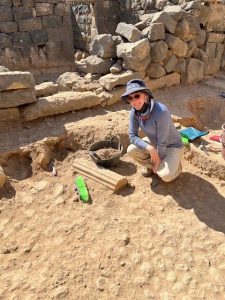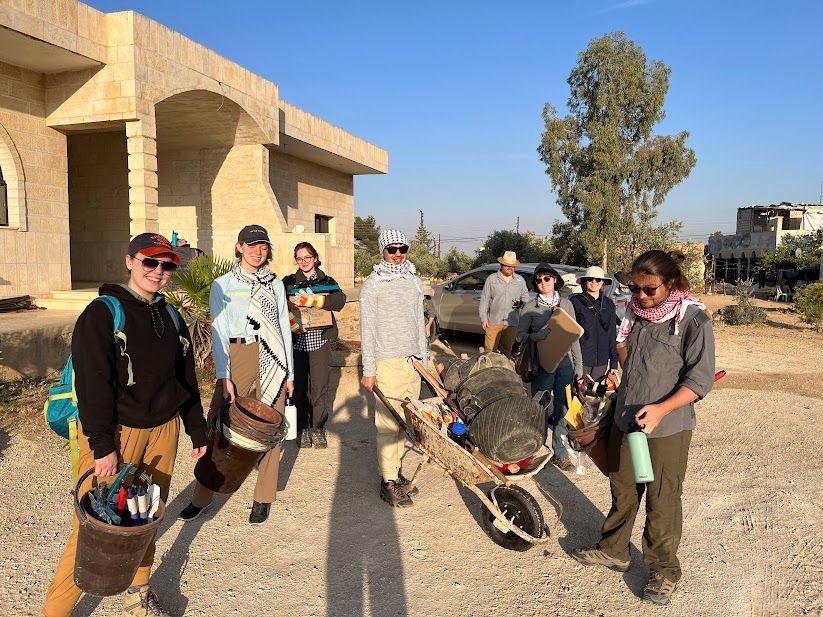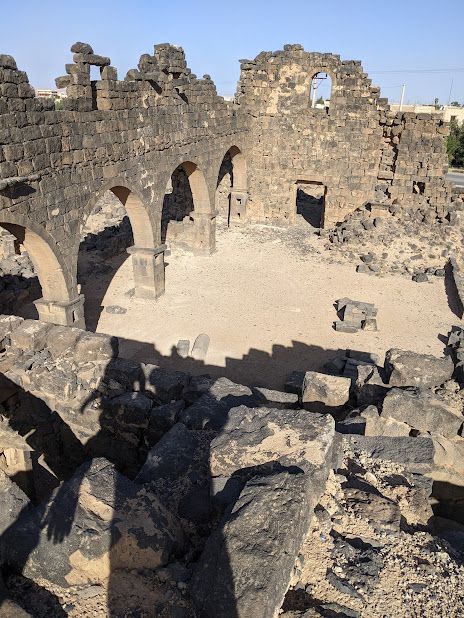
My Expectations of Desert Fieldwork vs. the Reality
Sarah Foster, 2022 Platt Scholarship
In May of 2022 I had the fortunate opportunity to be able to participate in fieldwork under the Umm al-Jimal Archaeological Project, taking part in excavations at their West Church. I shared this experience with fellow Calvin University undergraduate students, most of whom had little to no knowledge of the realities of archaeological fieldwork in a desert environment. Although I was passionate to finally do archaeology instead of reading about it. Yet, the classes I took in preparation led me to expect our work to look and be entirely different from what it actually was.
For instance, I was under the notion that the trench would be a perfect rectangle with no obstacles inhibiting my ability to trowel through the contexts and collect artifacts. We worked alongside the North end of the West Church, just outside the area of the apse in locations that were suspected to be rooms that were added later on in the church’s life. Before we had arrived, a local team had worked to clear these “rooms” of large rubble and stones that had been part of the infrastructure. Even when we started our fieldwork, we had to work around large stones that had been buried by sand over the ages since the building’s collapse. Our trench was therefore not a perfect square but instead a rubble-filled rectangle with areas that were never even excavated. From this I learned that while ideally, we’d like to dig up the entire area of the rooms to get a solid understanding of their layout and purpose, it just wasn’t physically possible. Instead, we strived to make the best of our trench by troweling in areas that were assumed to be most significant and drawing a top plan of the inaccessible parts to aide us in answering our research questions.
Additionally, I had not expected fieldwork to take much of a toll on my body besides the typical soreness from physical labor. I discovered that while working in a desert environment, if you are not used to it, can worsen your allergies and the dust can cause irritation in your eyes, nose, and throat. As a result, many of us started taking allergy medicine, opted to use masks to ward off as much dust as possible, and drank a lot of tea to soothe our throats. Ideally, we would have been able to put in 100% effort of work each day, but due to our body’s response to the environment, there were those of us that had to sit out for a day to allow our bodies to recover. This taught me that when conducting fieldwork in the desert, I cannot expect my body to function as it normal does in the environment I live in. Therefore, before going anywhere, it is just as important to research the environment and its potential effects as it is to do background research on the history.
Overall, conducting fieldwork at the West Church in Umm al-Jimal was a formative experience for me. I got to discover how archaeology is conducted in the field which I found was in practice a lot different than my expectations. This realization allowed me to comprehend that not only should archaeologists strive to achieve the ideals that are taught, but that they should in turn never expect them. Our rubble-filled trench in the deserts of northern Jordan provided difficulties, as do all other environments and sites when conducting fieldwork. The ideals that exist are expected in a perfect world that we will never find. Thus, it is important to have courage that you can overcome aspects of the obstacles of your environment but it is also important to take heart and embrace the differentness of your setting to reach the histories that lie within.

American Society of Overseas Research
The James F. Strange Center
209 Commerce Street
Alexandria, VA 22314
E-mail: info@asor.org
© 2023 ASOR
All rights reserved.
Images licensed under a Creative Commons Attribution-NonCommercial-ShareAlike 4.0 International License
COVID-19 Update: Please consider making payments or gifts on our secure Online Portal. Please e-mail info@asor.org if you have questions or need help.


